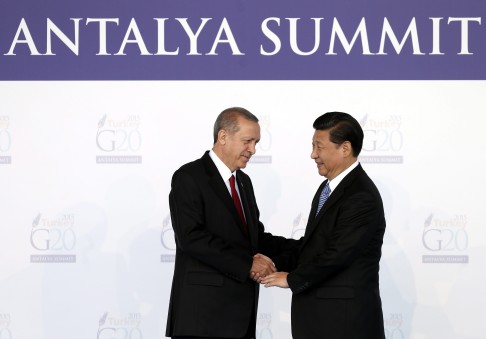Trade Heals All Enmities
"[The Chinese missile project] was one of the things that really made people say, 'Turkey is shifting, wow'."
"China wants to remake the global financial and economic structure."
Mehmet Soylemez, Asian studies specialist, Institute for Social and Political Researches, Ankara
The Chinese-made HQ-9 system. File photo
"So many years, we have been kept waiting at the edge of the European Union and people are losing hope. Turkey is not in the Trans-Pacific Partnership, and problems in the Arab world are pushing Turkey to have other alternatives."
Sahin Saylik, general manager, Kirpart OtomotivTurkey imports $25-billion worth of products from China annually, but exports a mere $3-billion to China, an impressive trade imbalance that does little for Turkey's bottom line. Turkish stores abound with Chinese goods. Chinese corporations purchase coal and marble mines in Turkey, and have established a 65 percent stake in the third-largest container port in the country. China is a military supplier to Turkey of lower-tech battlefield rockets.
Turkey thought it would be buying into a good thing when it flirted seriously with the idea of a joint venture with China to manufacture a sophisticated missile defense system with a $3.4-billion investment to boost Turkey's military firepower and provide a foundation to export missiles. Then reality entered the picture when pressure from NATO raised its objection, that a state-backed Chinese company would find Western military secrets accessible were Chinese technology to be incorporated into Turkey's air defences.
China is, however, busy courting Turkey, just as it does other countries that comprised a loose connection over a thousand years earlier along the Silk Road through land and seaborne trade. The plan, called the Belt and Road Initiative, while proposing to enrich China's trade relations with a myriad of countries is also the cause of geopolitical strains with those countries concerned about becoming too dependent on China.
To that end, Kazakhstan has placed a limit on Chinese investment; invariably any Chinese investment has a state-vested component. Chinese immigration has been limited as well, rather than stand the risk of being overwhelmed by Han Chinese looking for opportunities. Kyrgyzstan has chosen to pursue warmer relations with Moscow to counterbalance Beijing's hot embrace.
This obviously won't work now for Turkey since it has issued yet another warning to Moscow over the menace of Russian jets operating in Syria once again entering Turkey's airspace. Russia's entry into the Syrian conflict has not endeared it to Turkey, and Moscow has returned the compliment. The European Union has expressed little interest in embracing countries along the former Silk Road, and nor are those Asian nations pleased with the U.S.-led Trans-Pacific Partnership that has shut them out a regional trade deal.
"Ten years ago, Turkey didn't exactly see the threat of China for manufacturing. The threat has to be changed to the opportunity", observed T. Murat Kolbasi, chairman of Arzum which had formerly produced engineering and marketing for its Okka single-cup Turkish coffee brewers, acknowledging that the brewers are now manufactured in southeastern China. Universally, the trend has been to take advantage of lower-cost options of having everything manufactured in China.
And then there are the ethnic issues in recognition of the fact that populations of the countries in the region being Muslim with Turkish spoken in over a dozen countries as an Ottoman Empire legacy. Recep Tayyip Erdogan once protested Beijing's policies toward the Uighurs, the Xinjiang region's Muslims who speak a Turkic language, whom Beijing blames for attacks on Han Chinese from eastern China.
Mr. Erdogan no longer speaks of the 2009 Chinese crackdown on Uighurs as "a kind of genocide", despite that six months ago Turks and Uighurs held protests against China in Istanbul and Ankara. Now, ties with China are being promoted by Mr. Erdogan, informing his countrymen that rumours on social media about China's treatment of Uighurs may have no basis in reality.
 |
| Photo EPA -- President Erdogan shakes hands with President Xi Jinping at the G20 summit in Antalya, Turkey |


<< Home